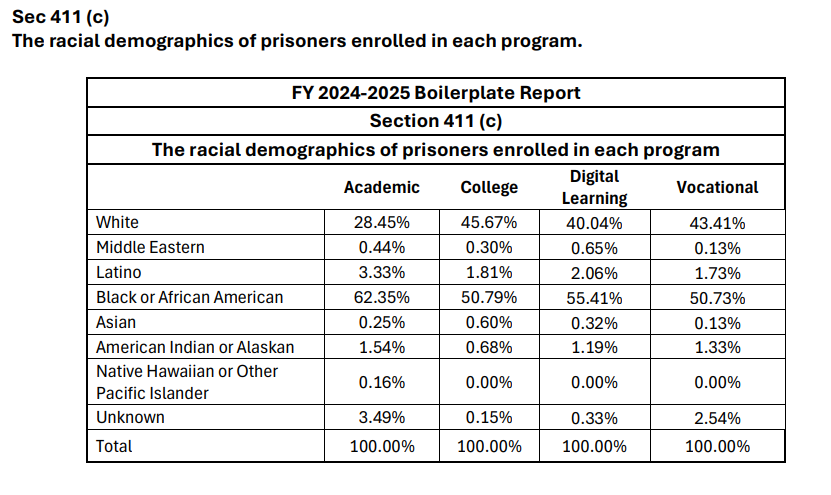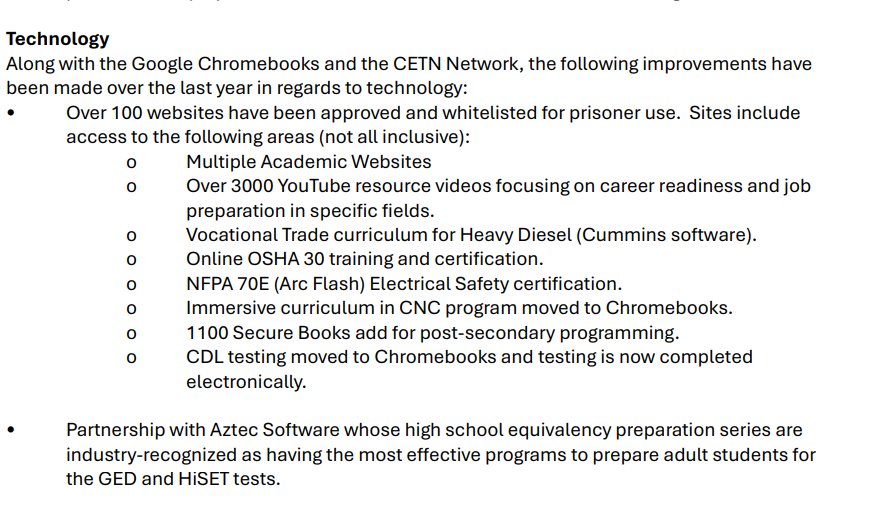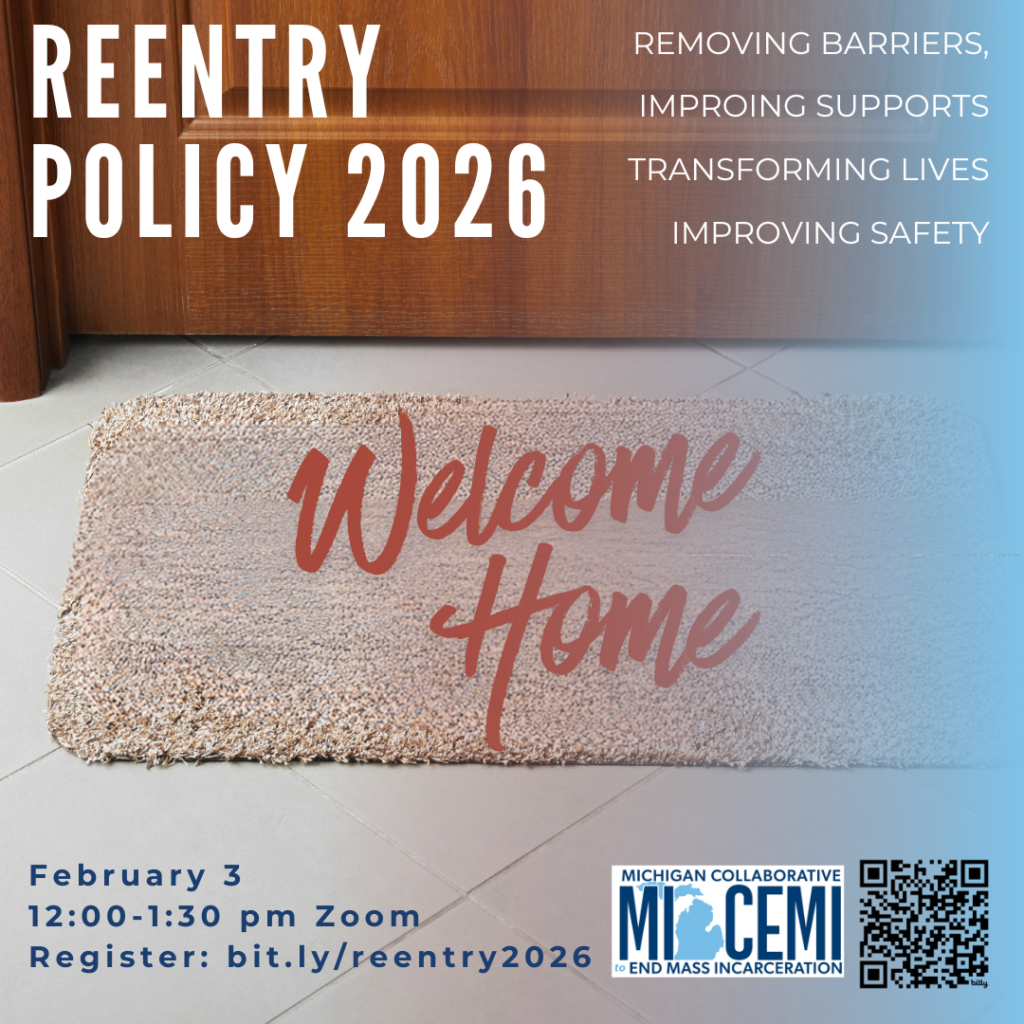-
The Michigan Department of Corrections released their most recent Academic and Vocational Summary Report last week. Within the report there are elements to celebrate, areas of concern, and missing data that would help drive further programming improvements.
MDOC data show that large numbers of people are on waiting lists for academic programming (often GED or High School Equivalency), College, Digital Learning, and Vocational Training.
Wait times are too long for academic and vocational training
MDOC data show that large numbers of people are on waiting lists for academic programming (often GED or High School Equivalency), College, Digital Learning, and Vocational Training.

On the opposite end of the spectrum, the report shows many incarcerated people with long sentences also unable to get into programming. One of the top complaints we hear among formerly incarcerated people is that they were given almost no access to programming until the last 6 – 36 months of their incarceration, then they were rushed through academic, reentry, and behavioral programming.
As vocational and academic programs are enrolled to capacity, fixing this is beyond MDOC’s purview alone. It would require legislators to increase investments in rehabilitation as a path to improved public safety.
MDOC and its college partners have done a good job of preventing racial disparities in college enrollment
In the United States, African Americans are over-represented in prison and under-represented in college. The school-to-prison pipeline is alive and well for Black students.
In Michigan, African Americans are about 14% of the state population and about 51% of the prison population.

That’s the bad news.
The good news is that within MDOC, African Americans make up 51% of incarcerated college students as well as 51% of vocational students. We do not see the enrollment disparities in prison that we do in the free world.
What the report does not show, however, are attainment or job placement data by race for these same programs. We do not know if there is a racial disparity in degree or certification attainment for the students enrolled in these courses or if there are racial disparities for who is able to attain a job in that field post-incarceration.
MDOC Reports Significant Improvements in Tech Access
Another chronic frustration among returning citizens is that they are unprepared for the digital demands of modern life.

Previous accounts of MDOC digital literacy efforts have reported out-of-date hardware and software, ineffective curricula, and limited access to using technology tools that would prepare people for reentry.
Against that history, MDOC’s increase in access to Chromebooks and Securebooks and the development of a secure network for digital access shows significant promise. That said, we have two caveats:
- Having the hardware and software is one thing, having access to it is another. Too often fancy new equipment sits unused in schools, nonprofits, and prison systems with the students unable to take advantage of the resources. Additional tracking, both by MDOC and by advocates, will be essential to assess if the tools are actually used and usable by incarcerated people.
- Digital fluency requires significant time trying out the new technology outside of formal classroom settings. Yes, a digital literacy course can teach you how to format a bulleted list or export to a PDF, but memorizing those steps doesn’t help when Google or Microsoft change their menus or when you need to figure out how to do something not on the curriculum. This requires time in self-directed experimentation with the tools, and departments of corrections in the US traditionally struggle to support that kind of unstructured learning. Our hope is that MDOC finds ways to ensure technology access outside of the classroom for incarcerated individuals to practice with the tools, whether or not they are currently enrolled in a formal academic or vocational program.
MDOC and Michigan Colleges and Universities Deserve Credit for Significantly Increasing Incarcerated College Enrollment
The rollout of the college in prison program has led to a 21% increase in enrollment by incarcerated college students.

College participation helps Michigan develop the skilled workforce we need for economic competitiveness, prevents recidivism, improves public safety, and anecdotally reduces prison misconduct.
MI-CEMI is grateful for the support for this program from MDOC, the participating Michigan colleges and universities, and from lawmakers who fund this effective public safety program.
(more…) -
On Thursday the Michigan Senate Committee on Civil Rights, Judiciary, and Public Safety is scheduled to vote on three bills to protect Michiganders against some of the most flagrant abuses by ICE:
(more…) -
2026 will be a major election year in Michigan. While we may all dread the onslaught of political ads, the election year can be a powerful opportunity to go beyond voting by educating candidates and voters and to build power to end mass incarceration.

Learn how you can seize this opportunity to shape the debate around public safety. Topics include:
- Voter mobilization and civic power: Making sure justice-impacted voices count in the election
- Building a transformative justice platform: Articulating our vision for public safety without mass incarceration
- Speak when they are listening: using election session to educate candidates on our issues
Thursday, Feb 12, 7:00-8:30pm via Zoom. Register for details
-
State and local policies can either help returning citizens succeed post incarceration or put obstacles in their way that impede reintegration.
Join the conversation on Tuesday, February 3, 2026 at 1:30 PM EST via Zoom.

Learn what policy proposals advocates in Michigan are pushing for to expand reentry support and remove obstacles and learn how you can help make them a success. Connect with other reentry service providers, advocacy leaders, and stakeholders to learn how you can help remove barriers and improve supports as people come home from prison.
Hear from state and national leaders on topics such as:
- Fair Chance Housing
- Coming home reentry ready with vital documents
- Dismantling barriers to employment
- Providing Achievement Credits for parole
Register below to get the link.
-
(more…)
Zip tying children. Deportations without due process. Inhumane detention conditions. Local law enforcement engaging in federal immigration enforcement.
These abusive practices are scary on their own. Even ore troubling is the risk that they will spill over to non-immigration law enforcement, jail, and prison practices.

